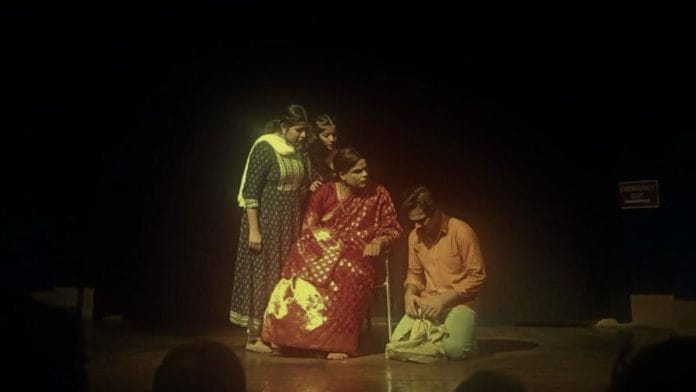New Delhi: “Mujhe ladki se shaadi nahi karni; mujhe ladke pasand hai (I do not want to marry a girl; I am attracted to boys),” Arnav declares, his voice trembling with both fear and defiance. Furious, his father responds with slaps and kicks, leaving the audience at New Delhi’s Lok Kala Manch in stunned silence.
In that moment, the weight of societal expectations and familial pressure is laid bare, as Arnav, the play’s protagonist, stands his ground against a world that refuses to understand him. Love Beyond Love, performed by the Rangastra Theatre Group, captures the raw and painful journey of those who dare to seek love and acceptance in a society resistant to queer identities.
“Everyone in this society has the permission to love each other, and everyone has the fortune to fall in love… but in my world, it doesn’t happen like that,” laments the character Guru Maa, a hijra Kathak teacher. Her words resonate deeply, weighing you down with empathy.
A heteronormative world
The play begins with Arnav’s son Anubhav, who is exasperated by the lewd comments people make about his father’s ‘effeminacy’. He is mocked and called names like ‘chawal ka ladka’ and ‘meethe ka baccha’, along with other insults directed at his father’s masculinity.
“People like Anubhav’s father – Arnav – exist among us,” said Yash Machhal, the director of the play. “And it hurts that while I am called by my name, people like Arnav are called meetha (effete) in this society.”
Machhal added that his play was, in fact, inspired by a real-life person, also named Arnav, who “is not with us anymore.”
As the story progresses, Anubhav, distressed by the constant conflict between his parents, sets out to uncover his father’s past with the assistance of Guru Maa. He discovers the truth about his father’s sexuality through love letters exchanged with a man named Animesh. Arnav and Animesh were deeply in love, but their romance was cut short when Arnav’s orthodox Bengali father found out about his sexuality and forced him into a marriage with a woman at a young age. This leads to profound familial sadness. Rejected by society, Arnav seeks refuge in his “divine love” for Krishna who, unlike the samaj (society), does not question his identity.
Also read: A history student and Bahadur Shah Zafar meet in a play. Aurangzeb is Shakespearean King Lear
Not for the elite
Homosexuality has been a recurring theme in numerous plays, with Ismat Chughtai’s short story Lihaaf being particularly popular for theatre adaptations in Hindi and Urdu. Other notable plays include Dohri Zindagi by Mumbai-based theatre group Play On, adapted from the work of Vijayan Detha; Dushyantpriya, directed by Sarang Bhakare; and Begam Barve by Satish Alekar. What makes these plays stand out is their use of local cultural, religious, and historical vocabulary to convey their messages.
This approach is in stark contrast with performances at posh, ‘for-elite’ events like the Delhi International Queer Theatre and Film Festival, notes Delhi-based social researcher Bincy Mary George. “Festivals like DIQTFF, in their urban centrism, exclusivity, and narrow gay narrative, fail to initiate the intended dialogue and discussion to address queer issues to the larger crowd,” she writes.
Love Beyond Love falls into the former category as it is peppered with multiple mythological, historical, and political references. From the Mahabharata to the Mughals, the play makes extensive use of these elements to highlight how queer people in India are treated. The play also encourages the audience to engage in self-reflection. Every time a character uses the word samaj, they point toward the audience, prompting viewers to consider their own roles in perpetuating social norms.
The audience’s rapt attention throughout the performance highlights the powerful impact of the play’s social messaging. When the play ended, a wave of enthusiastic applause filled the theatre. The director and actors were showered with heartfelt praise, with many singling out Sandeep Kumar for his poignant portrayal of Guru Maa.
Admirers approached the director with words of appreciation: “What a moving play,” “The theme was so unique and powerful,” and “It really made me think deeply.”
Machhal, pleased with the compliments, remarked with a smile, “Without the audience, we are meaningless.”
Also read: Orientalist artists romanticised Colonial-era India. Pilgrims disappeared from paintings
Theatre for social change
Indeed, theatre can be a powerful medium for changing public attitudes toward homosexuality. Unlike books or films, theatre’s live contact with the audience creates a more intimate and intense form of communication. As Machhal said, “Through theatre, we can attempt to bring about change even at the smallest level.” Before this, Machhal also directed other plays to promote social awareness on issues like mental disability.
While such theatre is primarily directed at the audience to bring about a transformation in their perspectives, the performers’ outlook too ends up getting transformed. “This drama is not only for the public; it has also been self-transformative for me,” said Kumar, who played Guru Maa. He added that the perspective with which he “used to view transgenders” has changed significantly “after performing in the play.”
Abhishek Ranjan, who played Arnav, too said that meeting people from the LGBTQ+ community and “learning from their experiences” changed his views and gave him the “inspiration to move forward” with his roles.
Interestingly, all the queer characters in the play were portrayed by straight men. This does highlight the issues of authentic queer representation and the limited opportunities for queer individuals to perform their own stories. However, the fact that queer stories are now getting represented in theatre and accepted by the audience stands as a testament to the evolving cultural landscape and the hope that one day, unconditional love and acceptance will be the norm rather than the exception.
(Edited by Aamaan Alam Khan)






